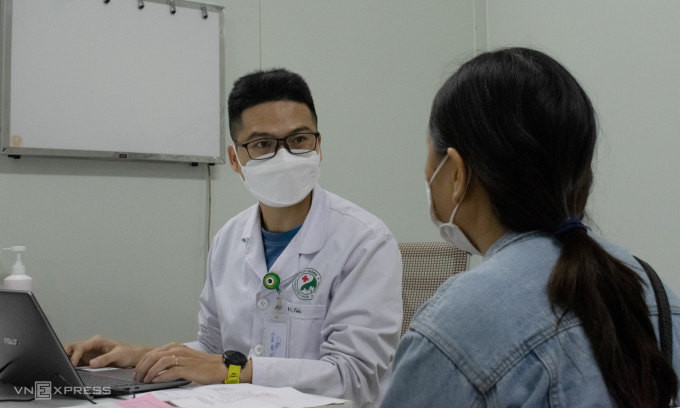Warning signs of Covid-19 sequelae
F0 people who are tired, have insomnia, chest pain, shortness of breath, hair loss, delayed menstruation, cough a lot, diarrhea... lasting for two months or more should go see a doctor for treatment, according to experts.
The World Health Organization (WHO) defines the syndrome aspost Covid-19usually occurs in people who have been infected for three months, with symptoms appearing and lasting for at least two months that are not explained by other diagnoses.
Dr. Hoang Bui Hai, Deputy Director of the Hospital for Treatment of Covid-19 Patients (Hanoi Medical University Hospital), said that Covid sequelae can manifest in one or more characteristics. Of which, fatigue, weakness and lack of endurance,... are the most common, whether the patient is hospitalized or not. This condition usually improves over time but can last for three months or longer, especially in severe patients who have been in intensive care.
Some other symptoms include shortness of breath lasting from two to three months, even 12 months; chronic cough lasting from two to three weeks; chest discomfort; changes in taste and smell; neurological cognition; insomnia, joint pain, headache, rhinitis, digestive disorders, poor appetite, dizziness; muscle pain, hair loss, sweating and diarrhea...
Some symptoms resolve more quickly than others, such as fever and chills; olfactory symptoms and discharge usually resolve within two to four weeks; fatigue, shortness of breath, chest tightness, cognitive impairment, and psychological effects can last from two to 12 months.
In addition, F0 who recover from the disease are prone to stress, depression, anxiety disorders..., of which anxiety is the most common. Psychological symptoms improve over time but can last a long time, especially F0 who are hospitalized are at risk of more persistent psychological illnesses.
According to Dr. Hai, the time it takes to resolve symptoms seems to depend on previous risk factors for the disease as well as the severity of the acute illness and the symptoms experienced by F0.
"Mild cases take about two weeks, but severe cases that require hospitalization can last two to three months, or longer," said Mr. Hai.
Dr. Than Manh Hung, from the Central Hospital for Tropical Diseases, also said that there are many post-Covid-19 complications, but most of them are mild. "Whenever you see symptoms that affect your health or make you worried, you can go see a doctor. You should not go to the doctor just to follow the trend," Mr. Hung advised.
In children, the symptoms are not as many, the rate of severe progression is lower, so there are very few studies mentioning post-Covid-19. A notable manifestation ismultisystem inflammatory syndrome (MIS-C), but this rate is very low.
Symptoms of MIS-C include: high fever, vomiting, digestive disorders; some children have headaches and loose stools. In addition, when children recover from Covid-19, their bodies are still weak, so parents should not let them exercise vigorously, but should gradually increase their physical activity. If your child is still tired, has symptoms such as sleep disorders, worsening diarrhea, etc., you should see a doctor.
 |
| Doctors at Duc Giang General Hospital examine and check a patient with Covid-19 symptoms. Photo: Chile |
Doctor note,Long-Covidis a symptom of Covid-19 patients that lasts up to three months even after recovery.Post Covidare new symptoms that appear after three months (since contracting the disease), and cannot be explained by other diagnoses. The sequelae are organ damage caused by Covid-19 such as embolism, myocarditis, pulmonary fibrosis... Therefore, symptoms that appear one to two months are often a sign of prolonged Covid-19, not necessarily post-Covid-19, "people should not worry too much".
Most patients with mild Covid-19 do not need testing when they recover, Dr. Hai recommends. F0 patients who are recovering from a serious illness, have been discharged from the hospital, or have unexplained prolonged symptoms need to do tests such as: blood count; blood biochemistry: electrolytes, blood urea and blood creatinine, liver function, blood albumin...
In addition, depending on the severity, doctors will request an electrocardiogram, chest X-ray, lung CT scan, echocardiogram, respiratory function test, arterial blood gas, and 6-minute walk test.
When going for a post-Covid-19 check-up, patients should bring previous health records (if any) for the doctor to refer to.

